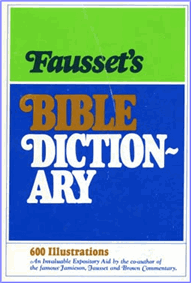Fausset's Bible Dictionary
A B C D E F G H I J K L M N O P Q R S T U V W X Y Z
Abaddon
The Hebrew in Job 31:12 and Proverbs 27:20, "destruction," or the place of destruction, sheol (Hebrew); Hades (Greek). The rabbis use Abaddon, from Psalm 88:12 ("Shall Thy lovingkindness be declared in destruction?") (abaddon) as the second of the seven names for the region of the dead. In Revelation 9:11 personified as the destroyer, Greek, apolluon, "the angel of the bottomless pit," Satan is meant; for he is described in Revelation 9:1 as "a star fallen from heaven unto earth, to whom was given the key of the bottomless pit"; and Revelation 12:8-9,12: "Woe to the inhabiters of the earth, for the devil is come down." Also Isaiah 14:12; Luke 10:18. As king of the locusts, that had power to torment not kill (Revelation 9:3-11), Satan is permitted to afflict but not to touch life; so in the case of Job (Job 1-2). "He walketh about as a roaring lion, seeking whom he may devour" (1 Peter 5:8). "A murderer from the beginning" (John 8:44), who abode not in the truth.
Elliott identifies the locusts with the Muslims; their turbans being the "crowns" (but how are these "like gold"?); they come from the Euphrates River; their cavalry were countless; their "breast-plates of fire" being their rich-colored attire; the fire and smoke out of the horses' mouths being the Turkish artillery; their standard "horse tails"; the period, an hour, day, month, and year, 396 years 118 days between Thogrul Beg going forth Jan. 18, 1057 A.D., and the fall of Constantinople, May 29, 1453 A.D.; or else 391 years and 1 month, as others say, from 1281 A.D., the date of the Turks' first conquest of Christians, and 1672 A.D., their last conquest. The serpent-like stinging tails correspond to Mohammedanism supplanting Christianity in large parts of Asia, Africa, and even Europe.
But the hosts meant seem infernal rather than human, though constrained to work out God's will (Revelation 12:1-2). The Greek article once only before all the periods requires rather the translation "for (i.e. "against") THE hour and day and month and year," namely, appointed by God. Not only the year, but also the month, day, and hour, are all definitively foreordained. The article "the" would have been omitted, if a total of periods had been meant. The giving of both the Hebrew and the Greek name implies that he is the destroyer of both Hebrew and Gentiles alike. Just as, in beautiful contrast, the Spirit of adoption enables both Jew and Gentile believers to call God, in both their respective tongues, Abba (Hebrew in marked alliteration with Abaddon Father (Greek, pater). Jesus who unites both in Himself (Galatians 3:28; Ephesians 2:14) sets us the example: Mark 14:36; Galatians 4:6. Jesus unites Hebrew and Gentiles in a common salvation; Satan combines both in a common "destru
Bibliography Information
Fausset, Andrew Robert M.A., D.D., "Definition for 'abaddon' Fausset's Bible Dictionary".
bible-history.com - Fausset's; 1878.
Copyright Information
© Fausset's Bible Dictionary
Fausset's Bible Dictionary Home
Bible History Online Home
Bible Encyclopedia (ISBE)
Online Bible (KJV)
Naves Topical Bible
Smith's Bible Dictionary
Easton's Bible Dictionary
Schaff's Bible Dictionary
Fausset's Bible Dictionary
Matthew Henry Bible Commentary
Hitchcock's Bible Dictionary

Dr. A.R. Fausset
Popular and Trending:
Meaning and definition of fasting, what is fasting in the bible, fasting definition, why should I fast, the power of prayer and fasting, Location of Galilee, where was galilee in the bible?, fasting definition, Galilee region, cities of Galilee, Sea of Galilee, Definition of biblical fire, what is fire in the bible?, fire and brimstone, fire meaning, baking bread with fire, Definition of the biblical firmament in Genesis, what is the firmament in the bible?, was the firmament the third heaven, firmament meaning, did the firmament bring the flood of Noah?.
